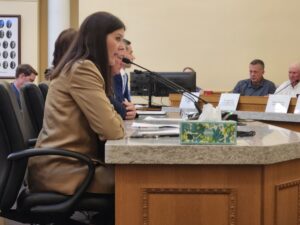While the first day of the 2025 special session was marked largely by the advancement of Democratic bills over Republican alternatives on many issues Wednesday, legislators also passed competing bills on artificial-intelligence regulation out of their first committees.
Senate Bill 4, a proposal from Democratic Senate Majority Leader Robert Rodriguez of Denver that is backed by consumer-rights and worker-advocacy organizations, passed on a party-line 4-3 vote out of the Senate Business, Labor and Technology Committee. House Bill 1008, an effort from Democratic Reps. William Lindstedt of Broomfield and Michael Carter of Aurora that’s lauded by business and technology groups, cleared the House Business Affairs & Labor Committee on an 8-5 vote in which GOP legislators made up the majority of the support.
While the two bills, both of which took on amendments to try to quiet some of their biggest critics Thursday, could be on a collision course, SB 4 is viewed as the proposal with the clearer path to passage. Rodriguez runs the calendar in the Senate and could make it difficult for HB 1008 to pass, and Lindstedt told the committee Thursday that sponsors “hope to start the compromise” on the two pieces of legislation.

Colorado state Reps. Alex Valdez and Bob Marshall listen while Rep. Amy Paschal explains her opposition House Bill 1008. Valdez and Marshall were two of the three Democratic on a committee Thursday to support the bill to relax AI regulations.
Polis officials laud bipartisan bill
Still, the early success of HB 1008 may force more compromise out of SB 4 backers — particularly with two members of Gov. Jared Polis’ administration extolling it Thursday as a proposal that “strikes the right balance.” While Polis last year signed Senate Bill 24-205, the law slated to enact the most comprehensive AI regulations in the country when it goes into effect in February, the Democratic governor has led the charge since then to roll back its rules as tech leaders warn that regulations could lead AI companies to relocate some or all of their workforces to other states.
“I didn’t want to be on a bill like this. I’d hoped the Legislature would fulfill its promise to fix 205, but it didn’t happen,” Lindstedt said to committee members. (SB) 205 was passed several years ago and no states have followed in that direction — and for good reason. It’s a real heavy-handed model, especially for deployers.”
Both SB 4 and HB 1008 would remove onerous parts of existing law, including cumbersome risk-assessment projections that developers of AI systems must make and creation of an appeals process by AI deployers for anyone unhappy with a consequential decision. But testimony throughout the two hearings revealed that while tech companies believe SB 4 would replace it with disclosure requirements that could be as onerous, groups like the Colorado AFL-CIO believe HB 1008 is merely “a mirage of consumer protection.”
Difference between AI bills
SB 4 would require deployers of AI system that turn down individuals for a job opening, insurance coverage or other significant request to list for them within 30 days the top 20 personal characteristics that led to the decision. While activists like Towards Justice policy director Nina DiSalvo said there can be no transparency into AI decisions without such explanations, Colorado Technology Association President/CEO Brittany Morris Saunders called the requirement “technically infeasible and especially burdensome to small businesses — without adding any meaningful consumer protection.”

Colorado Technology Association President/CEO Brittany Morris Saunders testifies on House Bill 1008 on Thursday.
“It leaves Colorado on an anti-technology island unique in the world,” said Adam Burrows of the Colorado Independent AI Coalition of small companies, arguing that SB 4 actually broadens the definition of AI in a way that would increase regulations.
In the same instances, HB 1008 would require deployers to disclose names of developers and of the AI system, and it would allow the Colorado Attorney General’s office to draft rules to ensure systems don’t violate antidiscrimination or consumer-protection laws. Jeff Kraft, deputy director of the Colorado Office of Economic Development and International Trade, said that would “provide Coloradans with meaningful protections while ensuring that businesses can thrive in our state,” while several labor supporters said the bill effectively eliminates current regulations.
“HB 1008 masquerades as a consumer-protection bill while shielding big tech companies from any accountability,” said Charles Brennan, director of income and housing policy at the Colorado Center on Law and Policy.
Changes to AI bills
Sponsors of both bills made amendments that seemed designed to answer criticism.
Rodriguez changed the 20-characteristics disclosure requirement so that it only would apply to individuals for whom AI had helped to make consequential decisions in areas like health care, housing, lending or insurance. And he added a cost-reducing provision exempting public agencies like school districts and local governments from the disclosure requirements, though affected individuals could still seek that disclosure via a Colorado Open Records Act request.

Colorado state Reps. William Lindstedt (foreground) and Michael Carter explain House Bill 1008 to a committee on Thursday.
Lindstedt, meanwhile, clarified in an amendment that individuals could still seek redress for Colorado Consumer Protection Act and Colorado Anti-Discrimination Act violations committed by AI systems through lawsuits. While neither bill creates a new private right of action for violations, some critics of HB 1008 said its wording gave the AG’s office exclusive authority to prosecute perceived violations, even in cases where lawsuits are now allowed.
Both bills are headed to the appropriations committees in their respective chambers on Friday morning and likely will be debated on the floors over the next two days. While there is no guarantee that either will make it over the finish line — or that Polis will sign SB 4, as Kraft and an Office of Information Technology leader called its disclosure requirements infeasible — but both are advancing for now.
“My priorities are protecting Colorado businesses and Colorado consumers, and if we can’t get past that, I don’t know where we go,” Rodriguez said. “Some people want to do nothing, and that is not an option for me.”
Tax and healthcare bills
In other action Thursday:
- House Democrats advanced, along party lines, five bills to roll back tax breaks like regional- and home-insurance office credits and to add about $144 million to this fiscal year’s budget while also permitting the sale of about $100 million in tax credits to qualified insurers and C corporations. The moves, combined with budget cuts and the use of funds in the state’s reserve fund, are key to closing a $783 million shortfall in this budget stemming from the passage of the federal “One Big Beautiful Bill” that added or extended business tax cuts.
- Also along party lines, Democrats rejected GOP bills that would have barred current or future tax-break rollbacks, including the elimination of vendor fees for tax-submitting retailers and the decoupling of state tax policy from federal tax policy that grants an overtime pay tax exemption and a 20% deduction for LLCs and sole proprietorships.
- A House committee advanced a bill to boost health-insurance subsidies for individual-market buyers by taking a loan from the state’s Unclaimed Property Trust Fund rather than by increasing fees on all health-insurance policies, as was originally proposed.
The session will resume on Friday morning and is expected to last at least through Sunday if not several days longer.
